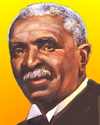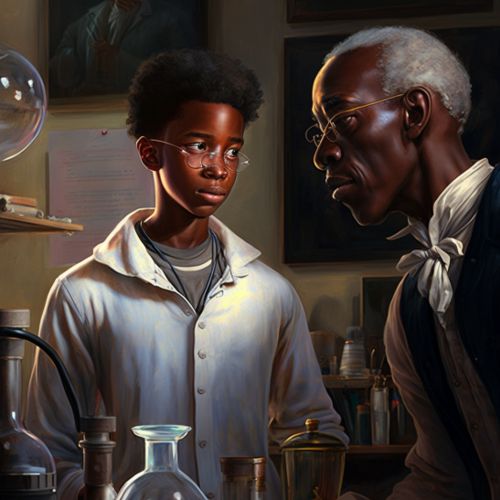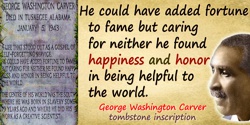 (source)
(source)
|
George Washington Carver
(Jan 1864 - 5 Jan 1943)
American agricultural chemist and agronomist who helped revolutionize the agricultural economy of the South. Carver demonstrated diversification—planting peanuts and sweet potatoes—to replenish impoverished soil. He developed over 300 new products from peanuts.
|
Darius Meets George Washington Carver
A Black History Month Time-Travel Adventure
Written by the Artificial Intelligence of ChatGTP

Imagined by Artificial Intelligence (midjourney)
Darius, a Black American school kid, was fascinated by science and was always searching for role models who looked like him and shared his passion. He spent hours reading books and watching videos about scientists of all kinds, but he was particularly drawn to Black scientists, who were often left out of the history books.
One day, while browsing in his school library, Darius stumbled upon a strange machine that looked like a time machine. Without hesitation, he climbed inside and set the dial to travel back in time. To his surprise, the machine actually worked, and he found himself transported to a different era.
Excited by the possibility of meeting one of his heroes, Darius set his sights on his favorite Black scientist in history: George Washington Carver. Carver was an agricultural scientist who lived in the late 19th and early 20th centuries and was best known for his work with peanuts and other crops.
When Darius arrived at the Tuskegee Institute, where Carver worked, he found the scientist in his laboratory, surrounded by pots of plants and jars of strange substances. Carver was so engrossed in his work that he didn't notice Darius at first, but when he finally looked up, his eyes lit up with delight.
“Welcome, young traveler!” said Carver. “What brings you here today?”
Darius explained that he was a student who loved science and was fascinated by Carver's work. He asked if he could spend some time with the scientist and learn more about his discoveries. Carver was happy to oblige and spent the next few hours showing Darius around the laboratory and answering his many questions.
As they worked together, Carver shared his story with Darius. He told him about his childhood on a farm, where he learned to love plants and animals, and about his journey to becoming a scientist. He explained how he discovered hundreds of new uses for peanuts and other crops, and how his work helped to improve the lives of farmers in the South.
“Science is about using your imagination and your creativity to solve problems and make the world a better place,” said Carver. “It's not just about knowing the answers, but about asking the right questions and working together to find solutions.”
Darius was in awe of Carver and was inspired by his dedication and passion for science. He felt grateful to have had the chance to meet one of his heroes and to learn from one of the greatest Black scientists of all time.
When the time came for Darius to return to the present, he thanked Carver for his time and said goodbye. As he stepped back into the time machine, he felt a newfound sense of purpose and determination to use his own love of science to make a difference in the world, just like Carver had done.
Darius returned to the present day with a newfound appreciation for the history of science and a desire to learn more about the Black scientists who came before him. He knew that there were countless other stories to be told, and he was eager to explore them all.
- Science Quotes by George Washington Carver.
- 5 Jan - short biography, births, deaths and events on date of Carver's death.
- George Washington Carver - The Need of Scientific Agriculture in the South.
- George Washington Carver: A Life, by Christina Vella. - book suggestion.
- Booklist for George Washington Carver.







